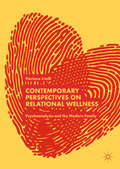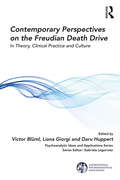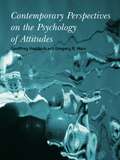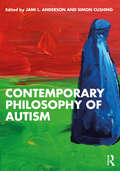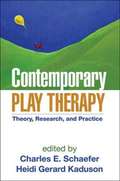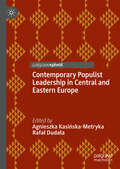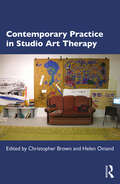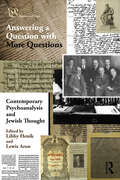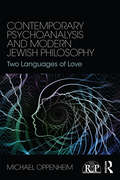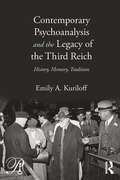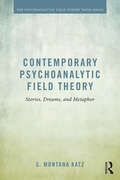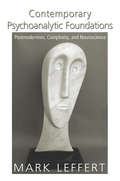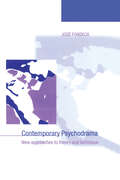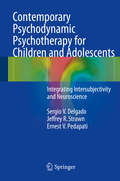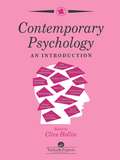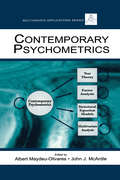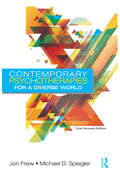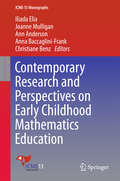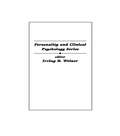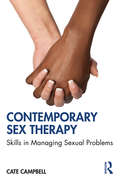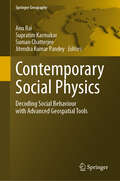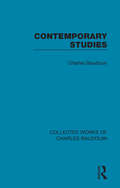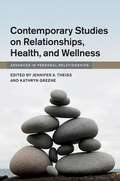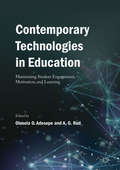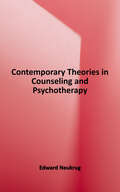- Table View
- List View
Contemporary Perspectives on Relational Wellness: Psychoanalysis and the Modern Family
by Floriana IrtelliThis book proposes new perspectives on relational wellness and the contemporary family—combining a psychoanalytic overview with scientific research about the burgeoning popularity of divorce, the increase in “stepfamilies,” and the use of social networks as well as other technologies. In this day and age, psychoanalysis has become increasingly interested in hyper-modern scenarios; for example, social networks and apps provide matching algorithms, which allow users to connect with people of similar interests. These networks have become one of the places where dissatisfied partners seek "more satisfactory situations.” In the United Kingdom, cohabitation lasts for up to two years, on average, and 40% of marriages end in divorce. In the United States, the percentage rises: it has now reached 50%. Today the value of temporariness, in which everything is fragmented, is exalted. On the other hand, is it wrong to deny the natural ebb and flow of human feeling?
Contemporary Perspectives on the Freudian Death Drive: In Theory, Clinical Practice and Culture (The International Psychoanalytical Association Psychoanalytic Ideas and Applications Series)
by Victor Blüml Liana Giorgi Daru HuppertContemporary Perspectives on the Freudian Death Drive provides a sustained discussion of the death drive from the perspective of different psychoanalytic traditions. Ever since Freud introduced the notion of the death drive, it has been the subject of intense debate in psychoanalysis and beyond. The death drive is arguably the most unsettling psychoanalytic concept. What this concept points to is more unsettling still. It uniquely illuminates the forces of destruction and dissolution at work in individuals as well as in society. This book first introduces Freud’s use of the term, tracing the debates and developments his ideas have led to. The subsequent essays by leading Viennese psychoanalysts demonstrate the power of the death drive to illuminate psychoanalytic theory, clinical practice, and the study of culture. Since this book originally arose from a conference in Vienna, its final segment is dedicated to the forced exile of the early Viennese psychoanalysts due to the Nazi threat. Due to its wide scope and the many perspectives it offers, this book is a tribute to the disturbing relevance of the death drive today. Contemporary Perspectives on the Freudian Death Drive is of special interest to psychoanalysts, psychotherapists, social and cultural scientists, as well as anyone intending to understand the sources and vicissitudes of human destructiveness.
Contemporary Perspectives on the Psychology of Attitudes
by Gregory R. Maio Geoffrey HaddockWhat is an attitude? How do different research approaches characterise 'attitude' and its applications in social psychology?The Attitude concept has long formed an indispensable construct in social psychology. In this volume, internationally renowned contributors review contemporary developments in research and theory to capture the current metamorphosis of this central concept. This book draws together the latest developments in the field to provide a scholarly and accessible overview of the study of attitudes, examining the implications for its position as a paradigm of social psychological understanding. Dividing the subject into two main parts, this book first addresses the structural and behavioural properties of attitudes, including the affective-cognitive structure of attitudes, the nature of attitude ambivalence and intention-behaviour relations. The second section focuses on representational and transformational processes, such as meta-cognitive attitudinal processes, the role of implicit and explicit attitudinal processes, cultural influences and attitude change. In a third, concluding section, the editors draw together these contemporary perspectives and elaborate on their impact for future theorising and research into attitudes. Empirically supported throughout, this collection represents a timely integration of the burgeoning range of approaches to attitude research. It will be of interest to social psychologists, sociologists, political scientists and researchers with an interest in attitudinal phenomena.
Contemporary Philosophy of Autism
by Simon Cushing Jami L. AndersonThis volume explores interesting and emerging philosophical questions related to autism. It sheds light on the ways in which cultural attitudes about autism have changed in the decade since the editors published their first volume on the philosophy of autism.So much about autism has changed in the last decade. Cultural attitudes about autism are far more nuanced. Self-identification as autistic has exploded, as have discussions of the political and social implications for being an out autistic person. This volume approaches a wide range of issues that autism raises in social and political theory, ethics, philosophy of social science, epistemology, metaphysics, and law. The issues addressed include moral responsibility, autism and gender, knowledge acquisition, the double empathy problem, social cognition, vulnerability in interpersonal communication, masking, the neurodiversity movement and destigmatization, and the effectiveness of ABA therapy. Each of the contributors, many of whom self-identify as autistic, has a personal connection with autism.Contemporary Philosophy of Autism will appeal to researchers and graduate students working in philosophy of mind, philosophy of cognitive science, epistemology, philosophy of medicine, and disability studies. It will appeal to those working in other academic fields such as developmental psychology, neuropsychology, cognitive psychology, and education.
Contemporary Play Therapy: Theory, Research, And Practice
by Charles E. Schaefer Heidi Gerard KadusonThis highly practical book presents current developments in play therapy, including innovative applications for particular problems and populations. Contributors first discuss the latest ideas and techniques emerging from object relations, experiential, dynamic, and narrative perspectives. <P><P> Next, research evaluating the effectiveness of play interventions is reviewed in detail. The book's third and largest section demonstrates creative approaches for helping children deal with a variety of adverse circumstances: homelessness, family problems, sexual abuse, social aggression, natural disasters, and more. Throughout, rich case illustrations enhance the book's utility for clinicians.
Contemporary Populist Leadership in Central and Eastern Europe
by Agnieszka Kasińska-Metryka Rafał DudałaThis book seeks to analyze the subject of populist leaders from a comparative perspective. Each chapter focuses on a specific country in central and Eastern Europe and adopts a common template for exploring the political landscape and leadership dynamics in each. Authors from the countries in question offer their insights and identify potential commonalities. The countries analyzed include Poland, Czechia, Slovakia, Slovenia, Lithuania, Hungary, Romania. The volume will be a valuable resource for exploring the political processes unfolding in Central and Eastern Europe.
Contemporary Practice in Studio Art Therapy
by Christopher Brown Helen OmandContemporary Practice in Studio Art Therapy discovers where studio practice stands in the profession today and reflects on how changing social, political, and economic contexts have influenced its ethos and development. This is the first UK volume devoted to studio art therapy, and the writers explore what is meant by a studio approach and how they are adapting art-based practices in radical new ways and settings. It comprises three parts – Part I: Frames of reference explores how particular social, cultural, and political contexts have led to the discourses within practice; Part II: Models of practice gives accounts of current studio art therapy practice, describing rationale for working methods and providing a resource for practitioners; Part III: Curating, exhibiting and archiving considers how the display and disposal of artworks, particularly relevant to studio approaches, may be thought about and implemented. The book includes chapters from North American authors who illustrate a trajectory of practice that has the potential to point to future developments. The book will be essential reading for practitioners and students who are interested in taking a fresh perspective on art therapy and will be encouraged by new ways of thinking about the studio approach in today’s changing world.
Contemporary Psychoanalysis and Jewish Thought: Answering a Question with More Questions (Psyche and Soul)
by Lewis Aron Libby HenikDemonstrating the connections between contemporary psychoanalysis, Jewish thought and Jewish history, this volume is a significant contribution to the traditions of dialogue, debate and change-within-continuity that epitomize these disciplines. The authors of this volume explore the cross-disciplinary connections between psychoanalysis and Jewish thought, while seeking out the resonance of new meanings, to exemplify the uncanny similarities that exist between ancient Rabbinic methods of interpretation and contemporary psychoanalytic theory and methodology, particularly the centrality of the question and the deconstruction of narrative. In doing so, this collaboration addresses the bi-directional influence between, and the relevance of, the Jewish interpretive tradition and psychoanalysis to provide readers with renewed insight into key topics such as Biblical text and midrash, religious traditions, trauma, gender, history, clinical work and the legacies of the Holocaust on psychoanalytic theory. Creating an intimate environment for interdisciplinary dialogue, this is an essential book for students, scholars and clinicians alike, who seek to understand the continued significance of the multiple connections between psychoanalysis and Jewish thought.
Contemporary Psychoanalysis and Modern Jewish Philosophy: Two Languages of Love (Relational Perspectives Book Series)
by Michael OppenheimRelational psychoanalysis and modern Jewish philosophy have much to say about the dynamics of human relationships, but there has been no detailed, thorough, and constructive examination that brings together these two incisive discourses. Contemporary Psychoanalysis and Modern Jewish Philosophy: Two Languages of Love explores the critical similarities and differences between the two disciplines, casting new light on both the analytic and philosophical understandings of how relationships develop, flourish, and fail. For psychoanalysts such as Hans Loewald, Stephen Mitchell, and Jessica Benjamin, love is seen as a fundamental life force, a key to human motivation, and the transformative core of Freud’s therapeutic "talking cure." The Jewish philosophers Franz Rosenzweig, Martin Buber, and Emmanuel Levinas envision love as having both a human and divine dimension, expressed through the dual commandments to love God and the neighbor. The two languages are brought to life through chapters that investigate: the relationship between self-love and love of the other, the dynamics of intersubjectivity, the methods and possibilities of human transformation, the "magical" powers of language, the goal of achieving a meaningful life, the significance of responsibility for others, and the challenge that death poses to life’s fullness. This multidisciplinary study, drawing on psychology, philosophy, religion, and feminism, provides an important contribution to contemporary scientific and humanistic interest in the social and relational dimensions of human living. The book will appeal especially to clinicians, theorists, and scholars of psychoanalysis, philosophy of religion, and Jewish studies as well as advanced students studying in these fields.
Contemporary Psychoanalysis and the Legacy of the Third Reich: History, Memory, Tradition (Psychoanalysis in a New Key Book Series)
by Emily A. KuriloffFor most of the twentieth century, Jewish and/or politically leftist European psychoanalysts rarely linked their personal trauma history to their professional lives, for they hoped their theory—their Truth—would transcend subjectivity and achieve a universality not unlike the advances in the "hard" sciences. Contemporary Psychoanalysis and the Legacy of the Third Reich confronts the ways in which previously avoided persecution, expulsion, loss and displacement before, during and after the Holocaust shaped what was, and remains a dominant movement in western culture. Emily Kuriloff uses unpublished original source material, as well as personal interviews conducted with émigré /survivor analysts, and scholars who have studied the period, revealing how the quality of relatedness between people determines what is possible for them to know and do, both personally and professionally. Kuriloff’s research spans the globe, including the analytic communities of the United States, England, Germany, France, and Israel amidst the extraordinary events of the twentieth century. Contemporary Psychoanalysis and the Legacy of the Third Reich addresses the future of psychoanalysis in the voices of the second generation—thinkers and clinicians whose legacies and work remains informed by the pain and triumph of their parents' and mentors' Holocaust stories. These unprecedented revelations influence not only our understanding of mental health work, but of history, art, politics and education. Psychoanalysts, psychologists, psychiatrists, sociologists, cultural historians, Jewish and specifically Holocaust scholars will find this volume compelling.
Contemporary Psychoanalytic Field Theory: Stories, Dreams, and Metaphor (Psychoanalytic Field Theory Book Series)
by S. Montana KatzContemporary Psychoanalytic Field Theory articulates the theory, heuristic principles, and clinical techniques of psychoanalytic field theory. S. Montana Katz describes the historical, philosophical and clinical contexts for the development of field theory in South America, North America and Europe. Field theory is a family of related bi-personal psychoanalytic perspectives falling into three principal models, which developed relatively independently. One of the principal models is based upon the work of Madeleine and Willy Baranger. The second, constructed by Katz, draws upon what is held in common by the implicit field theories in the United States of the interpersonal, intersubjective, relational and motivational systems’ psychoanalytic perspectives. The third is based upon the work of Antonino Ferro. For each, Katz elucidates its conception of mind, unconscious processes, the specific field concept employed, therapeutic goals, and clinical techniques. Similarities and differences of the models are illustrated. In the book, a fabricated analytic process is offered in which an analysand, Zoe, is engaged in three analyses. Each analyst works with the techniques of one of the three field theories. Katz conveys the diverging thought processes and technical choices of each analyst and the potentially different therapeutic outcomes of the application of each model. In the final chapters, Katz moves beyond the specific field theories to articulate a concept of a general field which underlies the three field concepts. She explores how to use this generalized field to find a form of common ground amongst the field theories, conjecturing that this generalized concept has application beyond field theory to a greater range of psychoanalytic perspectives. Contemporary Psychoanalytic Field Theory provides a clear and comprehensive guide that will appeal to psychoanalysts, psychoanalytic psychotherapists, mental health professionals and clinicians, as well as philosophers, psychologists, sociologists and anthropologists.
Contemporary Psychoanalytic Foundations: Postmodernism, Complexity, and Neuroscience
by Mark LeffertPast scholars have tried to classify psychoanalysis as an intrinsically positivist science, with varying degrees of success. Their critics have fared little better with narrow applications of postmodern thought, which focus on smaller areas within psychoanalysis and, as a result, neglect the evolution of the discipline as a whole. In an effort to provide a ground for current psychoanalytic thought, Mark Leffert creates an interreferential schema which balances the influences of postmodernism, complexity theory, and neuroscience as its key factors. Using the heterogeneity of postmodern thought as a starting point, he traces its impact on and implications for the development of the discipline, leading into the realm of complexity theory – which is relatively new to the psychoanalytic literature – and how it informs as well as constrains certain psychoanalytic assumptions. The book then turns to neuroscience, the "hard" scientific study of the complexities of the brain, and how recent research informs psychoanalytic theory and may shed light on aspects of memory, the conscious, and the unconscious. Taken together, these three elements create a firm basis for the current trends in psychoanalysis and the direction of its development in the years to come.
Contemporary Psychodrama: New Approaches to Theory and Technique
by José FonsecaContemporary Psychodrama weaves together psychodrama and psychoanalysis with illustrative clinical examples, whilst preserving the essence of psychodramatic philosophy and methodology. Previously unavailable in the English language, this book presents José Fonseca's diverse new approaches to psychodrama together with a blending of theories. The book is divided into clear sections, covering: * new approaches to psychodrama theory * new approaches to psychodrama technique* psychodrama and sexuality * the past and future of psychodrama. Fonseca's innovative ideas include the adaptation of techniques originally intended for groups to individual psychodramatic psychotherapy. He distinguishes between not only the normal and the mentally ill but the normal and the optimal, and presents a detailed developmental psychology, inspired by Moreno and Buber, but clearly influenced by object relations theory.Contemporary Psychodrama presents the original concepts of a leading light of the Brazilian psychodrama movement that will be of great benefit to all professionals working with psychodrama.José Fonseca, M.D., Ph.D., was one of the pioneers of the psychodramatic movement in Brazil and a founder of the Brazilian federation of psychodrama. He has published two books in Brazil, Psychodrama of Madness and Relationship Psychotherapy.
Contemporary Psychodynamic Psychotherapy for Children and Adolescents: Integrating Intersubjectivity and Neuroscience
by Sergio V. Delgado Jeffrey R. Strawn Ernest V. PedapatiContemporary psychodynamic theory profoundly impacts our understanding of the development of psychopathology in children and adolescents. This book creates new concepts derived from contemporary psychodynamic theory that necessitate a revision to the principles underlying our understanding of and approach to young patients in psychotherapy. Moreover, this book reviews recent contributions from contemporary two-person relational psychodynamic theory and makes use of detailed case examples to bring to life this theory's practical applications in child and adolescent psychotherapy. Psychotherapists and students of psychotherapy will find this book a valuable source of information on contemporary psychodynamic theory and a useful resource for introducing a contemporary style into their practice, co-constructing with the patient a narrative to achieve the desired goals.
Contemporary Psychology: An Introduction (Contemporary Psychology Ser. #Vol. 11)
by Clive HollinThis text provides a state-of-the-art summary of current issues in psychology, introducing the reader to contemporary thinking and research. The book discusses topics from areas as wide as cognitive, developmental, physiological, social and applied psychology, as well as individual differences and learning. The chapters provide an overview of current theory, research methodologies and research findings, covering how research is done and the problems researchers are actively engaged in solving, as well as pointing to areas for future research.; This text is intended to be of use as a companion to more traditional texts for students embarking on psychology courses and as a resource to the general reader with an interest in current issues in psychology.
Contemporary Psychometrics (Multivariate Applications Series)
by Albert Maydeu-OlivaresContemporary Psychometrics features cutting edge chapters organized in four sections: test theory, factor analysis, structural equation modeling, and multivariate analysis. The section on test theory includes topics such as multidimensional item response theory (IRT), the relationship between IRT and factor analysis, estimation and testing of these models, and basic measurement issues that are often neglected. The factor analysis section reviews the history and development of the model, factorial invariance and factor analysis indeterminacy, and Bayesian inference for factor scores and parameter estimates. The section on structural equation modeling (SEM) includes the general algebraic-graphic rules for latent variable SEM, a survey of goodness of fit assessment, SEM resampling methods, a discussion of how to compare correlations between and within independent samples, dynamic factor models based on ARMA time series models, and multi-level factor analysis models for continuous and discrete data. The final section on multivariate analysis includes topics such as dual scaling of ordinal data, model specification and missing data problems in time series models, and a discussion of the themes that run through all multivariate methods. This tour de force through contemporary psychometrics will appeal to advanced students and researchers in the social and behavioral sciences and education, as well as methodologists from other disciplines.
Contemporary Psychotherapies for a Diverse World: First Revised Edition (Theories Ser.)
by Michael D. Spiegler Jon FrewThis unique text is the first to provide an introduction to the theory and practice of the major theories of psychotherapy and, at the same time, illustrate how these approaches are dealing with the ever-increasing diversity of today's clients. Frew and Spiegler have assembled the leading contemporary authorities on each theory to offer an insider's perspective that includes exposure to the style and language used by adherents of the approach, which is not available in any other text. The history of each approach and the latest, cutting-edge theory and practice are integrated with an emphasis on an awareness of the needs of diverse non-majority clients, creating a comprehensive, practical, and invaluable text for any counseling theories course. The major psychotherapeutic approaches are presented in roughly the chronological order in which they were developed, and each chapter follows the same basic format to ensure consistency throughout the text. Along with traditional theories, there are chapters on reality therapy, feminist therapy, and narrative therapy, and the chapter on ethics includes multicultural and feminist perspectives. Each chapter includes: the origin and evolution of the theory theoretical foundations and how the theory is manifested in practice an evaluation of the evidence for the theory's success, limitations, blind spots, and challenges "The Author's Journey," in which authors describe what lead them to adopt their approach and how their own practice has evolved over time multicultural competencies and their importance in the context of the theory. Resources are available online for instructors to supplement the material in the text and include a test bank and PowerPoint lecture slides.
Contemporary Research and Perspectives on Early Childhood Mathematics Education (ICME-13 Monographs)
by Christiane Benz Ann Anderson Anna Baccaglini-Frank Iliada Elia Joanne MulliganThis book brings together a collection of research-based papers on current issues in early childhood mathematics education that were presented in the Topic Study Group 1 (TSG 1) at the 13th International Congress on Mathematical Education (ICME-13), held at the University of Hamburg in 2016. It will help readers understand a range of key issues that early childhood mathematics educators encounter today. Research on early childhood mathematics education has grown in recent years, due in part to the well-documented, positive relation between children’s early mathematical knowledge and their later mathematics learning, and to the considerable emphasis many countries are now placing on preschool education. The book addresses a number of central questions, including: What is mathematical structural development and how can we promote it in early childhood? How can multimodality and embodiment contribute to early mathematics learning and to acquiring a better understanding of young children’s mathematical development? How can children’s informal mathematics-related experiences affect instruction and children’s learning in different mathematics content areas? What is the role of tools, including technology and picture books, in supporting early mathematics learning? What are the challenges in early childhood mathematics education for teachers’ education and professional development?
Contemporary Rorschach Interpretation
by Carl B. Gacono J. Reid Meloy Marvin W. Acklin James F. Murray Charles A. PetersonAppreciation of the beauty and complexity of the human mind when perceiving an ambiguous stimulus led Dr. Hermann Rorschach to develop his scientific method eighty years ago. Full of gratitude for his brief life and work, the editors hope this volume will stand as an idiographic testament to his brilliance for the Rorschach students of the future. The contributors are clearly the most notable Rorschach clinicians in practice, and their work integrates the Comprehensive System and psychoanalytic methods. This book is organized into four sections. Within each of the first three sections -- devoted to psychotic, borderline, and neurotic disorders respectively -- the editors and invited authors have contributed Rorschach case studies which vertically cut a character pathology, personality disorder, or clinical diagnosis through a particular level of personality organization. The last section charts the enormously varied course that Rorschach work can navigate -- from the understanding of a Nobel laureate, the pain of trauma and transexuality, and the Nazi perversion of youth, to the consensus Rorschach in couple's therapy and cutting edge work in neuropsychology.
Contemporary Sex Therapy: Skills in Managing Sexual Problems
by Cate CampbellContemporary Sex Therapy explores modern sexuality, its expression and problems, and some of the uniquely twenty-first century issues facing sex therapists and society as a whole. Seeking solutions to these and other common sexual and relationship problems, the book provides a practical, sensitive and modern approach, which tackles the complexities of contemporary relationships, identity, love and sex. A comprehensive, stepped approach to psychosexual therapy is offered, demonstrating how to tackle blocks to sex and intimacy as well as providing an understanding of how and why they develop. Loss of desire, sexual pain and erectile and orgasm difficulties are seen within the context of modern life and relationship dynamics, so that comprehensive and realistic solutions are more readily enabled. The book looks at significant issues such as sexual consent, sexual and gender identity, sexual trauma and culture, as well as the more recent challenges of porn-related sexual dependency, chemsex, female genital cutting and technology. Throughout, the emphasis is on recognising and meeting the specific obstacles and needs of a wide diversity of relationships and experiences, providing a vast toolbox to appropriately address contemporary sexual issues. Established sex therapists, as well as students, will benefit from the book’s modern approach which focuses on each partner’s experience, avoiding outcome and response anxiety entirely and appreciating the range of pressures experienced by modern couples. Relationship therapists and couples themselves will also be motivated by new ideas and explanations, which often challenge existing intuitive understanding to produce nuanced and effective solutions to improve sex and intimacy.
Contemporary Social Physics: Decoding Social Behaviour with Advanced Geospatial Tools (Springer Geography)
by Jitendra Kumar Pandey Anu Rai Supratim Karmakar Suman ChatterjeeThis volume delves into how cutting-edge geospatial tools are revolutionizing social physics—the quantitative study of human behavior and spatial dynamics. Through real-world case studies, the book demonstrates how geospatial analysis is applied to pressing social and environmental challenges, from migration flows and resource distribution to healthcare access, crime, disaster management, and urban planning. Readers will explore how these tools reveal the complexities of human movement, socio-spatial interactions, and behavioral patterns. The book is structured into five sections, each tackling key topics at the intersection of social physics and geospatial analysis: Population Dynamics and Social Behavior: Examines refugee settlements, migrations, resource allocation, and the socio-spatial impacts of political violence and the COVID-19 pandemic. Social Learning and Environmental Management: Highlights how social learning influences agriculture, healthcare, and environmental management, with geospatial techniques improving outcomes like riverbank stability and crop yields. Spatial Heterogeneity and Social Behavior: Investigates how social behavior shifts across different spatial contexts, with a focus on crime, inequality, and pandemic response, including detailed insights into Kolkata’s COVID-19 management. Social Physics and Sustainability: Demonstrates how geospatial tools can advance sustainability efforts, including waste management, transportation optimization, and urban planning for peri-urban areas. Ideal for academics, researchers, urban planners, and policymakers, this volume provides innovative methodologies to address complex social, environmental, and economic challenges. Whether examining migration trends or advancing sustainability, this book equips readers with the tools to transform how we understand human behavior and space.
Contemporary Studies (Collected Works of Charles Baudouin)
by Charles BaudouinOriginally published in 1924, this title is divided into four parts, each looking at contemporary issues. Beginning with ‘The Liberators of the Mind’, the author discusses important thinkers of the time, such as Tolstoy and Nietzsche. The second part looks at ‘The War and the Peace’, which refers to the recently fought First World War. He then moves on to ‘Education and Society’, where discussions include Bahaism and Father Christmas. The final part looks at ‘Art and Criticism’, discussing the trends of French post-war poetry – realism, symbolism and dynamism – followed by a look at dynamic drawing. This volume is available again after many years out of print.
Contemporary Studies on Relationships, Health, and Wellness (Advances in Personal Relationships)
by Jennifer A. Theiss Kathryn GreeneClose relationships are a vital part of people's daily lives; thus family members, friends, and romantic partners play an integral role in people's health and well-being. Understanding the ways in which close relationships both shape and reflect people's health and wellness is an important area of inquiry. Showcasing studies from various disciplines that are on the cutting-edge of research exploring the interdependence between health and relationships, this collection highlights several relationship processes that are instrumental in the maintenance of health and the management of illness, including interpersonal influence, information management, uncertainty, social support, and communication. Although the existing health literature is rich with knowledge about individual and ecological factors that are influential in promoting certain health behaviors, the relationship scholars featured in this volume have much to contribute in terms of documenting the interpersonal dynamics that are involved in experiences of health and illness.
Contemporary Technologies in Education: Maximizing Student Engagement, Motivation, and Learning
by A. G. Rud Olusola O. AdesopeThis edited volume provides a critical discussion of theoretical, methodological, and practical developments of contemporary forms of educational technologies. Specifically, the book discusses the use of contemporary technologies such as the Flipped Classroom (FC), Massive Open Online Course (MOOC), Social Media, Serious Educational Games (SEG), Wikis, innovative learning software tools, and learning analytic approach for making sense of big data. While some of these contemporary educational technologies have been touted as panaceas, researchers and developers have been faced with enormous challenges in enhancing the use of these technologies to arouse student attention and improve persistent motivation, engagement, and learning. Hence, the book examines how contemporary technologies can engender student motivation and result in improved engagement and learning. Each chapter also discusses the road ahead and where appropriate, uses the current trend to predict future affordances of technologies.
Contemporary Theories in Counseling and Psychotherapy
by Edward NeukrugThis book provides readers with a comprehensive introduction to cutting-edge therapeutic approaches that are widely revered and used, but generally not included within traditional counseling theories textbooks. Readers learn theories that will not only keep their knowledge current in an evolving field, but also will help to improve and support the ongoing development of their personal practice. The text features contributed chapters written by scholars in the discipline that cover the following contemporary theories: contemporary psychodynamic therapy (CPT); contemporary person-centered counseling (CPCC); cognitive behavioral therapy (CBT); integrative post-modern therapy (IPMT: narrative, solution-focused, relational-cultural); dialectical behavior therapy (DBT); acceptance and commitment therapy (ACT); motivational interviewing (MI); positive counseling; neuro counseling (including EMDR); and complementary, alternative, and integrative modalities (CAM). <p><p>Each chapter presents the history of the theory, critical views of human nature, key concepts, and techniques, and an overview of the counseling process. Social and cultural issues and the efficacy of each theory are discussed. Each chapter concludes with a vignette that demonstrates a client experiencing the counseling approach, followed by questions to pique students' interest. Video demonstrations of select theories are included. A thoroughly modern and critical resource, Contemporary Theories in Counseling and Psychotherapy is ideal for courses focusing on current theories of counseling and psychotherapy. It's also an excellent supplementary resource for courses on classical theory.
